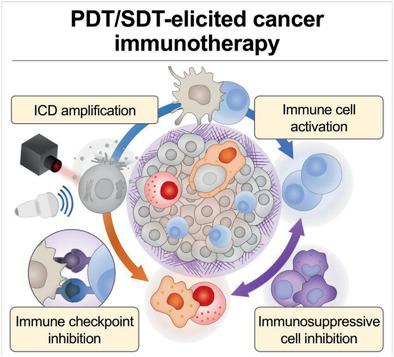当前位置:
X-MOL 学术
›
Adv. Funct. Mater.
›
论文详情
Our official English website, www.x-mol.net, welcomes your
feedback! (Note: you will need to create a separate account there.)
Sono/Photodynamic Nanomedicine‐Elicited Cancer Immunotherapy
Advanced Functional Materials ( IF 18.5 ) Pub Date : 2020-11-23 , DOI: 10.1002/adfm.202008061 Yuce Li 1, 2 , Jun Xie 2 , Wooram Um 1 , Dong Gil You 1 , Seunglee Kwon 1 , Lianbin Zhang 2 , Jintao Zhu 2 , Jae Hyung Park 1, 3, 4
Advanced Functional Materials ( IF 18.5 ) Pub Date : 2020-11-23 , DOI: 10.1002/adfm.202008061 Yuce Li 1, 2 , Jun Xie 2 , Wooram Um 1 , Dong Gil You 1 , Seunglee Kwon 1 , Lianbin Zhang 2 , Jintao Zhu 2 , Jae Hyung Park 1, 3, 4
Affiliation

|
Immunotherapy (e.g., cancer vaccines and checkpoint blockades), harnessing the host immune system to recognize and eradicate tumors, has emerged as one of the most potent cancer therapies. The clinical applications of cancer immunotherapies, however, have been limited by their low response rates and immune‐related adverse effects. In recent years, sono/photodynamic nanomedicines (SPNs) have received increasing attention for cancer therapy since they have been reported to mediate enhanced immunotherapy by generating reactive oxygen species under site‐specific exposure to exogenous energy sources. In particular, SPNs are capable of eliciting immunogenic cancer cell death, leading to the release of tumor‐associated antigens and damage‐associated molecular patterns. This allows for the maturation of antigen‐presenting cells, thus eliminating disseminated or metastatic tumor cells by cytotoxic CD8+ T cells. Such immunostimulatory features of SPNs provide opportunities to enhance therapeutic potential by amplifying anticancer immunity when combined with conventional immunotherapeutics, including immune checkpoint inhibitors. This review elaborates on the recent strategies and efforts undertaken by researchers to enhance SPN‐elicited cancer immunotherapy. The challenging issues and opportunities for SPNs in the activation of innate or adaptive immune responses and regulation of the tumor immunosuppressive microenvironment are also described.
中文翻译:

声波/光动力纳米药物诱发的癌症免疫治疗
利用宿主免疫系统识别和根除肿瘤的免疫疗法(例如,癌症疫苗和检查站封锁)已成为最有效的癌症疗法之一。然而,癌症免疫疗法的临床应用由于其低响应率和免疫相关的不良反应而受到限制。近年来,声/光动力纳米药物(SPN)在癌症治疗中受到越来越多的关注,因为据报道,声纳/光动力学纳米药物(SPN)通过在特定于外源能量的场所下产生活性氧来介导增强的免疫疗法。特别是SPN能够引发免疫原性癌细胞死亡,从而导致肿瘤相关抗原的释放和损伤相关分子模式。这可以使抗原呈递细胞成熟,+ T细胞。当与包括免疫检查点抑制剂在内的常规免疫疗法结合使用时,SPN的此类免疫刺激功能可通过增强抗癌免疫力来提供增强治疗潜力的机会。这篇综述详细阐述了研究人员为增强SPN引发的癌症免疫疗法而采取的最新策略和所做的努力。还介绍了SPN在激活先天或适应性免疫反应以及调节肿瘤免疫抑制微环境方面的挑战性问题和机遇。
更新日期:2020-11-23
中文翻译:

声波/光动力纳米药物诱发的癌症免疫治疗
利用宿主免疫系统识别和根除肿瘤的免疫疗法(例如,癌症疫苗和检查站封锁)已成为最有效的癌症疗法之一。然而,癌症免疫疗法的临床应用由于其低响应率和免疫相关的不良反应而受到限制。近年来,声/光动力纳米药物(SPN)在癌症治疗中受到越来越多的关注,因为据报道,声纳/光动力学纳米药物(SPN)通过在特定于外源能量的场所下产生活性氧来介导增强的免疫疗法。特别是SPN能够引发免疫原性癌细胞死亡,从而导致肿瘤相关抗原的释放和损伤相关分子模式。这可以使抗原呈递细胞成熟,+ T细胞。当与包括免疫检查点抑制剂在内的常规免疫疗法结合使用时,SPN的此类免疫刺激功能可通过增强抗癌免疫力来提供增强治疗潜力的机会。这篇综述详细阐述了研究人员为增强SPN引发的癌症免疫疗法而采取的最新策略和所做的努力。还介绍了SPN在激活先天或适应性免疫反应以及调节肿瘤免疫抑制微环境方面的挑战性问题和机遇。











































 京公网安备 11010802027423号
京公网安备 11010802027423号